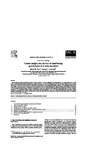Current insights into the role of transforming growth factor-beta in bone resorption

Date
2005-01-01Author
Subject
Metadata
Show full item recordAbstract
Transforming growth factor-beta (TGF-beta) elicits a variety of effects on cellular proliferation and differentiation. The major repository for TGF-beta is bone, where it possesses separate facilitative and suppressive actions on osteoclast differentiation and bone resorption. Without a direct enabling stimulus from TGF-beta monocytes cannot form osteoclasts but instead follow macrophage differentiation pathways. This facilitative action depends on an ability to promote a state in which precursors are resistant to anti-osteoclastic inflammatory signals. Following the initiation of resorption TGF-beta is released from bone matrix. This acts on osteoblasts to reduce the availability of the osteoclast differentiation factor, RANKL (receptor activator of NFkappaB ligand) and thereby indirectly limits further osteoclast formation. Thus TGF-beta has a fundamental role in the control of bone resorption having actions that first allow monocytes to develop into osteoclasts then subsequently limiting the extent and duration of resorption after its release from the bone matrix.
Collections
Publisher
Place of Publication
Journal
Volume
Issue
Pagination
Recommended, similar items
The following license files are associated with this item:

